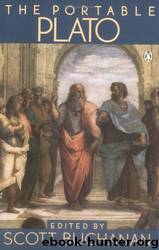The Portable Plato by Plato; Scott Buchanan

Author:Plato; Scott Buchanan
Language: eng
Format: mobi
ISBN: 0140150404
Publisher: Penguin
Published: 1953-01-02T00:00:00+00:00
“For the life-giving daughters of Inachus the river of Argos”;
—let us have no more lies of that sort. Neither must we have mothers under the influence of the poets scaring their children with a bad version of these myths—telling how certain gods, as they say, “Go about by night in the likeness of so many strangers and in divers forms”; but let them take heed lest they make cowards of their children, and at the same time speak blasphemy against the gods.
Heaven forbid, he said.
But although the gods are themselves unchangeable, still by witchcraft and deception they may make us think that they appear in various forms?
Perhaps, he replied.
Well, but can you imagine that God will be willing to lie, whether in word or deed, or to put forth a phantom of himself?
I cannot say, he replied.
Do you not know, I said, that the true lie, if such an expression may be allowed, is hated of gods and men?
What do you mean? he said.
I mean that no one is willingly deceived in that which is the truest and highest part of himself, or about the truest and highest matters; there, above all, he is most afraid of a lie having possession of him.
Still, he said, I do not comprehend you.
The reason is, I replied, that you attribute some profound meaning to my words; but I am only saying that deception, or being deceived or uninformed about the highest realities in the highest part of themselves, which is the soul, and in that part of them to have and to hold the lie, is what mankind least like;—that, I say, is what they utterly detest.
There is nothing more hateful to them.
And, as I was just now remarking, this ignorance in the soul of him who is deceived may be called the true lie; for the lie in words is only a kind of imitation and shadowy image of a previous affection of the soul, not pure unadulterated falsehood. Am I not right?
Perfectly right.
The true lie is hated not only by the gods, but also by men?
Yes.
Whereas the lie in words is in certain cases useful and not hateful; in dealing with enemies—that would be an instance; or again, when those whom we call our friends in a fit of madness or illusion are going to do some harm, then it is useful and is a sort of medicine or preventive; also in the tales of mythology, of which we were just now speaking—because we do not know the truth about ancient times, we make falsehood as much like truth as we can, and so turn it to account.
Very true, he said.
But can any of these reasons apply to God? Can we suppose that he is ignorant of antiquity, and therefore has recourse to invention?
That would be ridiculous, he said.
Then the lying poet has no place in our idea of God?
I should say not.
Or perhaps he may tell a lie because he is afraid of enemies?
That is inconceivable.
But he may have friends who are senseless or mad?
But no mad or senseless person can be a friend of God.
Download
This site does not store any files on its server. We only index and link to content provided by other sites. Please contact the content providers to delete copyright contents if any and email us, we'll remove relevant links or contents immediately.
| Africa | Americas |
| Arctic & Antarctica | Asia |
| Australia & Oceania | Europe |
| Middle East | Russia |
| United States | World |
| Ancient Civilizations | Military |
| Historical Study & Educational Resources |
Mythos (2019 Re-Issue) by Stephen Fry(1483)
Alexander the Great by Robin Lane Fox(1287)
On Sparta (Penguin Classics) by Plutarch(1122)
Antigone Rising: The Subversive Power of the Ancient Myths by Helen Morales(1093)
Persian Fire by Tom Holland(1025)
The Last Days of Socrates by Plato & Christopher Rowe & Plato(972)
The Classical World: An Epic History From Homer to Hadrian by Robin Lane Fox(967)
Cicero by Anthony Everitt(912)
The Athenian Constitution (Classics) by Aristotle(885)
Antigone Rising by Helen Morales(791)
The Greek World(779)
The Riddle of the Labyrinth(747)
The Story of the Greeks (Yesterday's Classics) by Guerber H. A(727)
The Eudemian Ethics (Oxford World's Classics) by Kenny Anthony(710)
The End of the Bronze Age by Robert Drews;(694)
The Homeric Hymns (Penguin Classics) by Homer(680)
Guide to Greece by Pausanias(678)
Lords of the Sea: The Epic Story of the Athenian Navy and the Birth of Democracy by John R. Hale(677)
Astrology and Religion Among the Greeks and Romans by Cumont Franz(647)
